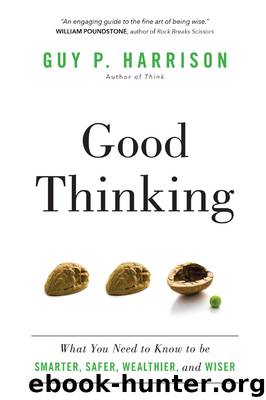Good Thinking by Guy P. Harrison

Author:Guy P. Harrison
Language: eng
Format: epub
ISBN: 9781633880658
Publisher: Prometheus Books
Published: 2015-09-13T16:00:00+00:00
The world's legal systems need to catch up to what science has already revealed about human vision and memory, as well as pay close attention to new discoveries. Fortunately, this is happening in some places. In 2011, the New Jersey State Supreme Court introduced sweeping changes to how eyewitness testimonies are handled in courtrooms, including a requirement for judges to explain to juries that there are many problems associated with vision and memory if questions were raised about reliability during the proceedings. Chief Justice Stuart J. Rabner wrote in his opinion: “Study after study revealed a troubling lack of reliability in eyewitness identifications. From social science research to the review of actual police lineups, from laboratory experiments to DNA exonerations, the record proves that the possibility of mistaken identification is real…. Indeed, it is now widely known that eyewitness misidentification is the leading cause of wrongful convictions across the country.”21
One year later, the Court went further and issued instructions to all New Jersey judges that they must inform jurors about some of the potential problems with eyewitness testimonies before deliberations begin. The instructions include these statements: “Human memory is not foolproof. Research has revealed that human memory is not like a video recording that a witness need only replay to remember what happened. Memory is far more complex.”22
This particular intersection of law and brain science is of great importance and is sure to continue shaking the foundations of legal systems everywhere for many years to come. It needs to because it is clear that police departments and courts have relied too heavily on the fragile memories of eyewitnesses when searching for suspects and pursuing convictions. Given the high stakes of crime and punishment, the need for change is obvious. Furthermore, the lesson here for those who would dedicate themselves to good thinking is profound. If honest, intelligent human beings err routinely when seeing and recalling dramatic crimes—even when they themselves are the victims—how can any of us trust our own less important memories? Perhaps our memories might best be thought of as a starting point, a place from which to begin our search for answers and wise decision making.
Download
This site does not store any files on its server. We only index and link to content provided by other sites. Please contact the content providers to delete copyright contents if any and email us, we'll remove relevant links or contents immediately.
Enlightenment Now: The Case for Reason, Science, Humanism, and Progress by Steven Pinker(7308)
A Journey Through Charms and Defence Against the Dark Arts (Harry Potter: A Journey Through…) by Pottermore Publishing(4811)
The Immortal Life of Henrietta Lacks by Rebecca Skloot(4581)
A Journey Through Divination and Astronomy by Publishing Pottermore(4382)
Elon Musk by Ashlee Vance(4122)
Origin Story: A Big History of Everything by David Christian(3689)
COSMOS by Carl Sagan(3618)
Alchemy and Alchemists by C. J. S. Thompson(3516)
Bad Pharma by Ben Goldacre(3422)
Enlightenment Now by Steven Pinker(3367)
Shadow of Night by Deborah Harkness(3361)
Inferior by Angela Saini(3311)
A Mind For Numbers: How to Excel at Math and Science (Even If You Flunked Algebra) by Barbara Oakley(3302)
Origin Story by David Christian(3196)
The Code Book by Simon Singh(3185)
Signature in the Cell: DNA and the Evidence for Intelligent Design by Stephen C. Meyer(3132)
The Elements by Theodore Gray(3053)
A Brief History of Time by Stephen Hawking(3022)
A Journey Through Potions and Herbology (A Journey Through…) by Pottermore Publishing(2852)
